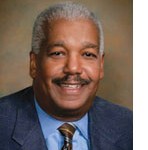The Remarkable Rise of One of Texas’s Most Accomplished Families
How an African American family achieved extraordinary prominence in San Antonio during the height of Jim Crow–era segregation.
Photo: Sutton family photo taken in 1917, with Lillian and Samuel seated in the center. (Courtesy of UTSA Special Collections)
(Texas Monthly) For much of San Antonio’s history, to be black and live on the city’s East Side, the historical and spiritual home of African Americans, was to feel as if one were living on the outskirts of the city’s concern. One troubling example occurred during San Antonio’s last celebration of a major birthday, in 1968. That year, the city hosted the World’s Fair, and in preparation, officials decided to convert Commerce Street, the main artery connecting the East Side and downtown, into a one-way road flowing toward downtown—and away from black-owned businesses. So it’s remarkable that, at the turn of the twentieth century, a community long excluded from San Antonio produced a family way ahead of its time.
Samuel J. Sutton, the son of a slave, was born in Virginia, in 1863. He operated a gold mine in Mexico before moving to San Antonio to become an educator. At Guadalupe College, in Seguin, he met another young teacher, Lillian V. Smith, of New Orleans. Over the next several years, they got married, settled on the East Side of San Antonio, and started a family. They had twelve children, and all those who lived to adulthood went to college. The couple also became serial entrepreneurs, eventually owning a skating rink, funeral home, mattress company, and farm. As prominent figures in the community, they often hosted luminaries like Booker T. Washington, Mary McLeod Bethune, and Thurgood Marshall. (more)
The triumph of Henry Reeves, UT’s first black athletics trainer
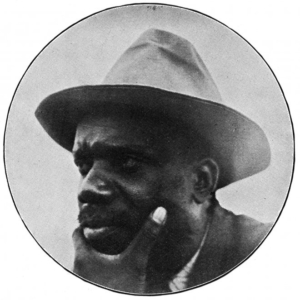 In the history of the University of Texas, few persons have become so appreciated and integral to the 40 Acres that they’re considered campus traditions. Henry Reeves was one.
In the history of the University of Texas, few persons have become so appreciated and integral to the 40 Acres that they’re considered campus traditions. Henry Reeves was one.
Henry Reeves was born April 12, 1871 in West Harper, Tennessee. The middle of five children, his parents, Benjamin and Sarah Reeves, were former slaves.
According to old city directories found in the Austin History Center, in 1983, the family moved to Austin, where Benjamin found work as an expressman, a potentially hazardous position, where he was responsible for the delivery of a train’s cash, gold and other valuables. Benjamin rode the express car and guarded the safe from would-be thieves. He was the only person who had memorized the combination, a talent he would pass on to
his son.
Henry worked odd jobs for several local families before the University hired him in 1897 as a janitor for the new, student-created gymnasium in the basement of the old Main Building.
Affable and eager to do a good job, Henry impressed everyone with his ability to memorize the combinations of hundreds of gym lockers. He was soon drafted to be the water carrier and equipment manager of the football team, but when his basic knowledge of first aid and medicine came to be known, his duties expanded to include athletic trainer for all UT athletes. Students began to call him “Doc” Henry. (more)
Group seeks to turn historically black Dunbar neighborhood in San Marcos into official cultural district
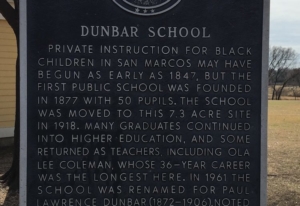 (Community Impact Newspaper) A local group is looking for San Marcos City Council’s support in turning a historic area of the city into an official cultural district.
(Community Impact Newspaper) A local group is looking for San Marcos City Council’s support in turning a historic area of the city into an official cultural district.
Led by Texas State University assistant professor Shetay Ashford, who also runs The P2P Movement, a nonprofit and workforce development corporation aimed at improving the economic prosperity of global underserved communities, the group is looking to get an official state cultural district designation for the historically black Dunbar neighborhood.
The proposed neighborhood would consist of the Calaboose African American History Museum, Eddie Durham Jazz Park, Cephas House, Dunbar School, the historic First Baptist Church and several historically black churches.
The Dunbar neighborhood is already a city-designated historic district, along with downtown, Hopkins Street, Belvin Street, Burleson and Lindsey-Rogers.
In a letter of intent to the Texas Commission on the Arts in January, advocates said an official state designation would revitalize the community while “spurring much-needed growth.” (more)
Black pioneer among inductees for Cotton Bowl game Hall of Fame
 Wallace Triplett, a running back at Penn State, will be among six inductees on May 8 for the Cotton Bowl Hall of Fame. In 1948, Triplett and teammate Dennie Hoggard were the first black players to participate in the annual New Year’s Day classic played in Dallas.
Wallace Triplett, a running back at Penn State, will be among six inductees on May 8 for the Cotton Bowl Hall of Fame. In 1948, Triplett and teammate Dennie Hoggard were the first black players to participate in the annual New Year’s Day classic played in Dallas.
Both players also made history at Penn State as the first black members of the program’s varsity squad. Tripplett, a heralded offensive threat at tailback and a hard-hitting linebacker on defense, was the Nittany Lions’ first African-American football star. In the 1948 Cotton Bowl match against Southern Methodist, Triplett and Hoggard did more than play football. They broke down racial barriers in Texas. When asked to consider leaving the team’s two black players at home, their teammates’ quick response was one of solidarity…“We are Penn State, there will be no meetings.”
Triplett played as advertised against SMU and reeled in the game-tying touchdown with a six-yard catch in the third quarter. The game ended in a 13-13 tie. The final score aside, Triplett, Hoggard and Penn State had taken a stand that New Year’s Day, one for a more just society. (more)
TIPHC Bookshelf
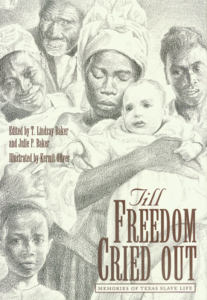 Published scholarship on black history in Texas is growing and we’d like to share with you some suggested readings, both current and past, from some of the preeminent history scholars in Texas and beyond. We invite you to take a look at our bookshelf page – including a featured selection – and check back as the list grows. A different selection will be featured each week. We welcome suggestions and reviews. This week, we offer, “Till Freedom Cried Out, Memories of Texas Slave Life,” edited by T. Lindsay Baker and Julie P. Baker.
Published scholarship on black history in Texas is growing and we’d like to share with you some suggested readings, both current and past, from some of the preeminent history scholars in Texas and beyond. We invite you to take a look at our bookshelf page – including a featured selection – and check back as the list grows. A different selection will be featured each week. We welcome suggestions and reviews. This week, we offer, “Till Freedom Cried Out, Memories of Texas Slave Life,” edited by T. Lindsay Baker and Julie P. Baker.
“I’s born in Palestine Texas. I don’t know how old I is. I was 9 years old when freedom cried out.”
These poignant words begin the memories of a former Texas slave interviewed by W.P.A. field workers in Oklahoma during the 1930s. This account, along with thirty-two additional oral histories recorded as part of the Federal Writers’ Project, describes life as a Texas slave—the family relations, entertainment, religion, work on the plantations, foodways, and punishment.
For decades the bondage of black slaves to white masters was part of everyday life in Texas, and by the eve of the Civil War almost one-third of the total population consisted of slaves.
Most works about slavery have been written from the white viewpoint, since most slaves were kept illiterate. This collection offers a clear-eyed perspective on this institution from the slaves themselves—their recollections from being sold away from their parents, suffering the pain of the overseers’ lash, and being chosen to gratify masters’ desires to finding emotional release in religious services, appreciating music and dancing, and enjoying an brief escape to the woods. Vignettes of daily life are sensitively brought to life in the skilled drawings of artist Kermit Oliver.
Enriched by these illustrations and by an introduction and postscript commentary by editors T. Lindsay Baker and Julie P.Baker, “Till Freedom Cried” Out presents vivid memories of lives and times inside the bonds of an institution that tried to break the tellers’ bodies and souls.
This Week in Texas Black History
Apr 29
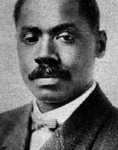 This date marks the birth of physician J. Edward Perry in 1870 in Clarksville, Texas. Born to former slaves, Perry graduated from Bishop College in Marshall in 1891 then from Meharry Medical College in Nashville, Tenn. in 1895. On November 1, 1910 he founded the Perry Sanitarium and Training School for Nurses (and doctors) to tend black patients in Kansas City. The sanitarium was renamed Wheatley-Provident Hospital in 1915 and Dr. Perry served as its superintendent from 1910 until 1930. At age 76, Perry came out of retirement to serve as executive director of the Houston Negro Hospital in March 1947. Through his dedicated efforts, the hospital became accredited and affiliated with Baylor College of Medicine.
This date marks the birth of physician J. Edward Perry in 1870 in Clarksville, Texas. Born to former slaves, Perry graduated from Bishop College in Marshall in 1891 then from Meharry Medical College in Nashville, Tenn. in 1895. On November 1, 1910 he founded the Perry Sanitarium and Training School for Nurses (and doctors) to tend black patients in Kansas City. The sanitarium was renamed Wheatley-Provident Hospital in 1915 and Dr. Perry served as its superintendent from 1910 until 1930. At age 76, Perry came out of retirement to serve as executive director of the Houston Negro Hospital in March 1947. Through his dedicated efforts, the hospital became accredited and affiliated with Baylor College of Medicine.
Apr 29
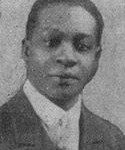 In 1892, Carter W. Wesley, newspaperman and political activist, was born on this day in Houston. Wesley received a B.A. degree from Fisk University in Nashville in 1917, entered the Army and became one of the first black officers in the U.S. military. After serving in World War I, he earned a law degree from Northwestern University in Evanston, Illinois and in 1927 returned to Houston where he bought into a newly formed publishing company which owned the Houston Informer newspaper. In 1934, he became publisher and used the paper as a platform to battle racism and to speak on behalf African Americans. Wesley was also a founder of the National Newspaper Publishers Association, a federation of more than 200 black community newspapers across the United States.
In 1892, Carter W. Wesley, newspaperman and political activist, was born on this day in Houston. Wesley received a B.A. degree from Fisk University in Nashville in 1917, entered the Army and became one of the first black officers in the U.S. military. After serving in World War I, he earned a law degree from Northwestern University in Evanston, Illinois and in 1927 returned to Houston where he bought into a newly formed publishing company which owned the Houston Informer newspaper. In 1934, he became publisher and used the paper as a platform to battle racism and to speak on behalf African Americans. Wesley was also a founder of the National Newspaper Publishers Association, a federation of more than 200 black community newspapers across the United States.
Apr 29
 Carl Edward Gardner, an original member of the 1950’s R&B/Rock and Roll group The Coasters, was born on this day in 1928 in Tyler. Gardner moved to Los Angeles in 1952 and sang with The Robins, a group that included Bobby Nunn, from 1954-1955. Gardner and Nunn left the Robins to help form the Coasters in the fall of 1955. Gardner led on such Coasters’ hits as ‘Poison Ivy,’ ‘Yakety Yak‘ and ‘Charlie Brown.’ The group was inducted into the Rock and Roll Hall of Fame on January 21, 1987 as the first vocal group receiving that honor. The Coasters had six gold records (million sellers).
Carl Edward Gardner, an original member of the 1950’s R&B/Rock and Roll group The Coasters, was born on this day in 1928 in Tyler. Gardner moved to Los Angeles in 1952 and sang with The Robins, a group that included Bobby Nunn, from 1954-1955. Gardner and Nunn left the Robins to help form the Coasters in the fall of 1955. Gardner led on such Coasters’ hits as ‘Poison Ivy,’ ‘Yakety Yak‘ and ‘Charlie Brown.’ The group was inducted into the Rock and Roll Hall of Fame on January 21, 1987 as the first vocal group receiving that honor. The Coasters had six gold records (million sellers).
Apr 29
On this day in 1991, Marcelite Harris became the U.S. Air Force’s first African-American female general. Harris is a Houston native who graduated from Kashmere Gardens High School in 1960. Among her many other “firsts,” she was also the first woman aircraft maintenance officer, one of the first two women air officers commanding at the U.S. Air Force Academy, and the first woman deputy commander for maintenance. She was the highest ranking woman in the U.S. Air Force and the highest ranking black woman in the entire Department of Defensewhen she retired in 1997.
May 1
Olympic sprinter and National Football League running back Ollie Matson was born on this day in 1930 in Trinity, Texas. At age 14, he moved with his family to San Francisco, and in 1952 earned a bachelor’s degree in history from the University of San Francisco. In 1951, he led the nation with 1,566 yards rushing and 21 touchdowns and was named an All-American as a defensive back. The next year, he won a bronze medal in the 400-meter dash and a silver medal as part of the 4×400-meter relay team at the Olympic Games in Helsinki, Finland and was the No. 3 overall pick in the NFL Draft by the Chicago Cardinals. In his 14-year career, Matson set a league record with nine career touchdown returns and retired with 12,884 combined net yards (rushing, receiving, and returns), an NFL record at the time. He also played with the Los Angeles Rams, the Detroit Lions and the Philadelphia Eagles. The Rams traded eight players and a draft choice to the Cardinals to get Matson in 1959, in one of the biggest deals in league history. Matson was a six-time All-Pro and shared Rookie of the Year honors in 1952 with San Francisco 49ers running back Hugh McIlhenny. In 1972, the first year he was eligible, Matson was elected to the Pro Football Hall of Fame, and in 1976 was inducted into the College Football Hall of Fame.
May 2
On this day in 2009, the Texas Medical Association (TMA) elected Houston neurologist William H. Fleming III as its 144th president and the first African American to lead the group. A native of Memphis, Fleming was named a Texas Super Doctor by Texas Monthly magazine In 2005 and 2006, and Top Doctor by Houston magazine in 2007.
Blog: Ron Goodwin, Ph.D., author, PVAMU history professor
Ron Goodwin is an assistant professor of history at Prairie View A&M University. Even though he was a military “brat,” he still considers San Antonio home. Like his father and brother, Ron joined the U.S. Air Force and while enlisted received his undergraduate degree from Texas Lutheran University in Seguin, Texas. After his honorable discharge, he completed graduate degrees from Texas Southern University. Goodwin’s book, Blacks in Houston, is a pictorial history of Houston’s black community. His most recent book, Remembering the Days of Sorrow, examines the institution of slavery in Texas from the perspective of the New Deal’s Slave Narratives.
Recent Posts
King of Kings
During his lifetime Martin Luther King consistently paralleled the experiences of the biblical Children of Israel and the experiences of Africans in America. As a result, he thrust himself into the role of Moses. What I find interesting in these parallels was the ultimate goal of the story. The Children of Israel, after 400 years of bondage, eventually made their way to the Promised Land. This was the message that I believe King was ultimately
Wakanda Forever — Part 2
The internet records the following regarding the financial success of the Black Panther as of March 25, 2018: Receipts grossed $631.4million in the US and Canada and a worldwide total of $1.239 billion; The film made $370.5million worldwide in its opening weekend (the 15th largest of all time); Thus far, Black Panther is the highest-grossing solo superhero film and the 3rd third highest-grossing movie in the Marvel Cinematic Universe (MCU); and In only five weeks after
Submissions wanted
Historians, scholars, students, lend us your…writings. Help us produce the most comprehensive documentation ever undertaken for the African American experience in Texas. We encourage you to contribute items about people, places, events, issues, politics/legislation, sports, entertainment, religion, etc., as general entries or essays. Our documentation is wide-ranging and diverse, and you may research and write about the subject of your interest or, to start, please consult our list of suggested biographical entries and see submission guidelines. However, all topics must be approved by TIPHC editors before beginning your research/writing.
We welcome your questions or comments. Please contact Mr. Michael Hurd, Director of TIPHC, at mdhurd@pvamu.edu.



